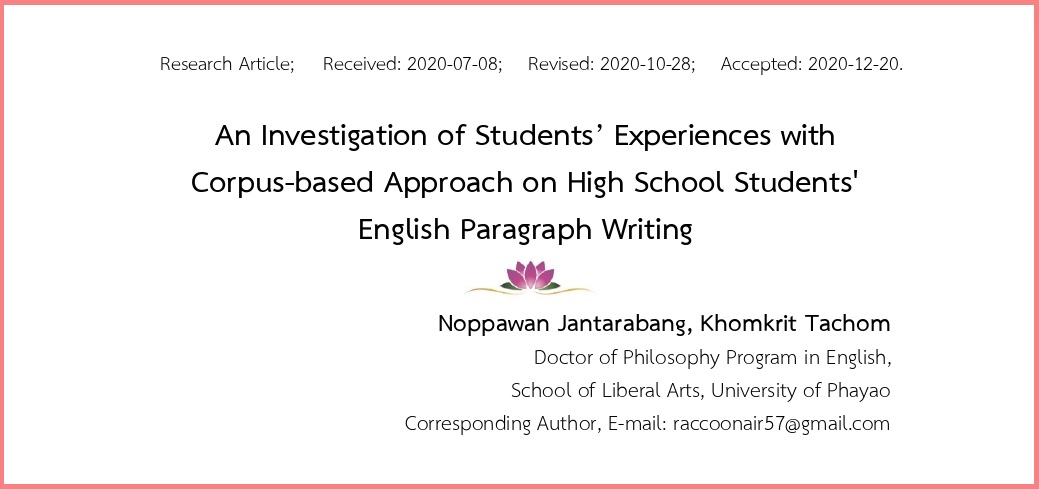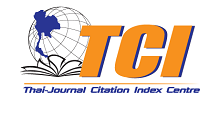An Investigation of Students’ Experiences with Corpus-based Approach on High School Students' English Paragraph Writing
คำสำคัญ:
Paragraph Writing, Corpus-based Approach, Teaching and Language Corporaบทคัดย่อ
This research aims to (1) examine the effectiveness of Corpus-based Approach on students’ grammatical competence for writing narrative paragraphs, and (2) to examine students’ attitude towards using a Corpus-based Approach instructional material to improve upon the students’ paragraph writing skills. Thirty-four Grade 11 students are used as participants. The mixed-method research design is adopted in the present research. The instruments are as follows: (1) pre-writing and post-writing ability tests; (2) learner diaries; and (3) semi-structured interview. Frequency, percentage, error analysis, and content analysis are adopted for data analysis.
To examine the effectiveness of Corpus-based Approach on students’ grammatical competence for writing narrative paragraphs, the results reveals that the frequencies of the students’ grammatical errors found in the writing ability test (330) after learning are lower than the errors found in the writing ability test (504) before learning. To examine students’ attitude towards using a Corpus-based Approach instructional material to improve upon the students’ paragraph writing skills, the learners’ diaries show students’ positive attitudes towards learning through Corpus-based Approach in writing classes and using corpus websites helped students to avoid committing grammatical writing and lexical errors. The results from the semi-structured interviews also indicate the benefits of corpus materials as it is beneficial for error corrections and developing the students’ English writing ability, grammatical writing ability, and vocabulary usage. The important findings from this research are that Corpus-based Approach can be an effective method for teaching writing, improving students’ grammatical ability and vocabulary knowledge.
Downloads
เอกสารอ้างอิง
Boontam, P. and Phoocharoensil, S. (2018). Effectiveness of English Preposition Learning through Data-driven Learning (DDL). 3L: The Southeast Asian Journal of English Language Studies. 24 (3), 125-141.
Boonyarattanasoontorn, P. (2017). An Investigation of Thai Students’ English Language Writing Difficulties and Their Use of Writing Strategies. Journal of Advanced Research in Social Sciences and Humanities. 2 (2), 111-118.
Chang, J.-Y. (2010). Postsecondary EFL Students’ Evaluations of Corpora with regard to English Writing. SNU Journal of Education Research. 19, 57–85.
Dar, M. F., and Khan, I. (2015). Writing Anxiety among Public and Private Sectors Pakistani Undergraduate University Students. Pakistan Journal of Gender Studies. 10 (1), 121–136.
Foomani, E. and Khalaji, K. (2016). Corpus-based versus Traditional Collocation Learning: The Case of Iranian EFL Learners. Journal of Social Science Studies. 3 (2), 103-116.
Girgin, U. (2011). Corpus-based Activities at Lower Levels of EFL Proficiency: The Effectiveness of Using Concordance Lines on Grammar Learning. (Master’s Thesis). Bilkent University. Ankara.
Haider, G. (2012). An Insight into Difficulties Faced by Pakistani Student Writers: Implications for Teaching of Writing. Journal of Educational and Social Research. 2 (3), 17–27.
Hyland, K. (2003). Second Language Writing. Cambridge: Cambridge University Press.
Interviewee 1. (2019). Excellent Student at Latyaowitthayakhom School, Nakhon Sawan. Interview. 8 November.
Interviewee 3a. (2019). Good Student at Latyaowitthayakhom School, Nakhon Sawan. Interview. 6 December.
Interviewee 3b. (2019). Average Student at Latyaowitthayakhom School, Nakhon Sawan. Interview. 22 November.
Interviewee 5. (2019). Average Student at Latyaowitthayakhom School, Nakhon Sawan. Interview. 22 November.
Interviewee 9. (2019). Average Student at Latyaowitthayakhom School, Nakhon Sawan. Interview. 22 November.
Jacobs, L. H. (1981). Testing ESL Composition: A Practical Approach. Rowley, MA: Newbury House.
Kaweera, C. (2013). Writing Error: A Review of Interlingual and Intralingual Interference in EFL Context. English Language Teaching. 6 (7), 9-18.
Kularb, T. and Noom-ura, S. (2015). The Effects of a Corpus-based Teaching Approach to Improve Collocations Comprehension of Thai Students in a Secondary School. In the 4th LITU International Graduate Conference, “World English and Asian Integration.” Language Institute, Thammasat University, Bangkok Thailand. pp. 313-327.
Noom-ura, S. (2013). English-teaching Problems in Thailand and Thai Teachers’ Professional Development Needs. English Language Teaching. 6 (11), 139-147.
Nunan, D. (1989). Design Tasks for the Communicative Classroom. Cambridge: Cambridge University Press.
Thongmee, A. and Meesri, R. S. (2019). A Comparative Study of Collaborative Writing through Small Mixed-Ability Groups to Reduce Writing Anxiety of Grade 12 Student. An Online Journal of Education. 14 (2), OJED1402036-14.
Watcharapunyawong, S. and Usaha, S. (2013). Thai EFL Students' Writing Errors in Different Text Types: The Interference of the First Language. English Language Teaching. 6 (1), 67-78.






